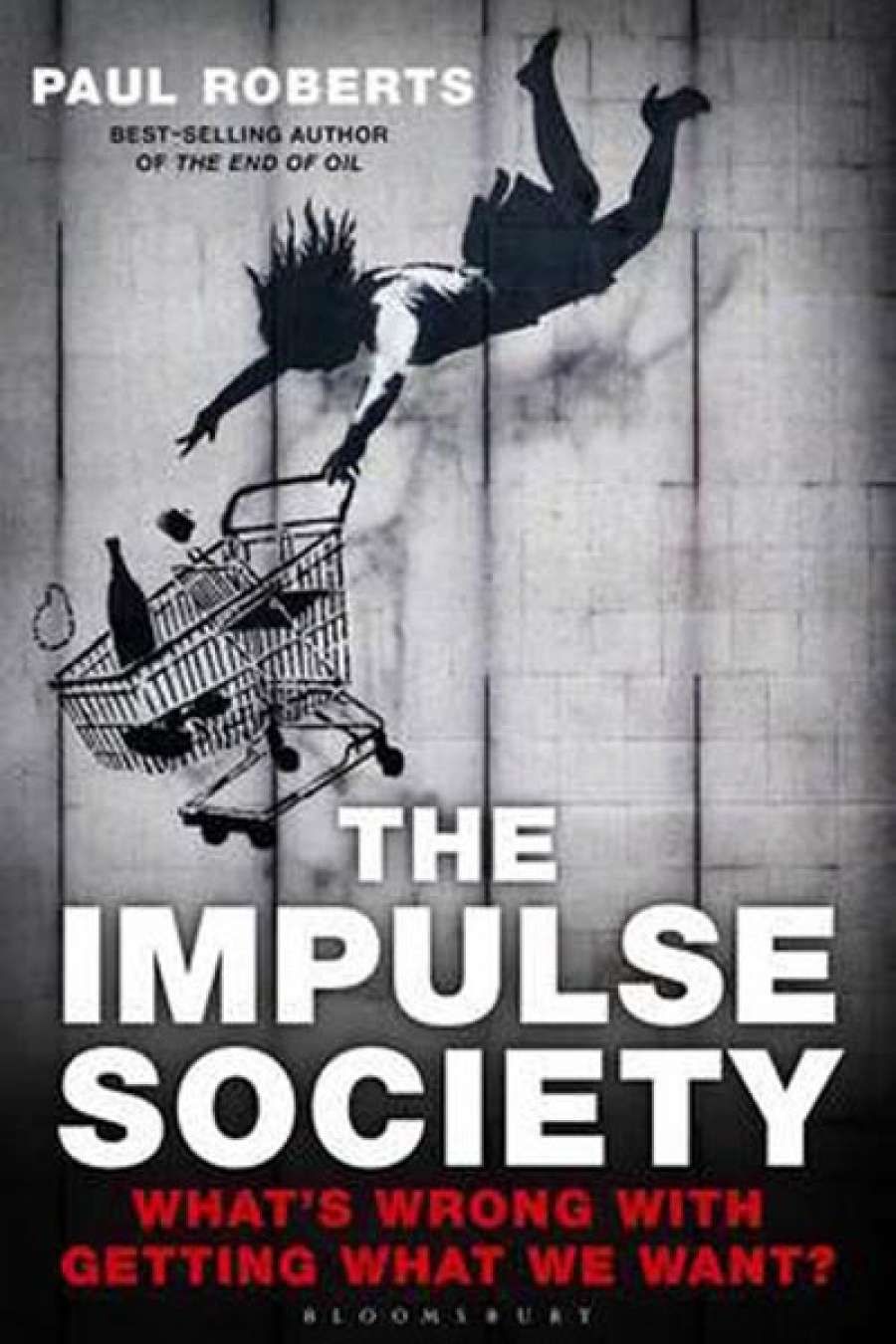
- Free Article: No
- Contents Category: Politics
- Custom Article Title: Ben Brooker reviews 'The Impulse Society' by Paul Roberts
- Review Article: Yes
- Article Title: What's wrong with getting what we want?
- Online Only: No
- Custom Highlight Text:
Paul Roberts’s The Impulse Society is the latest entry in a now familiar subtype of polemic: that of the society in decline, the symptoms of which run the gamut of Western post-industrialist ills from childhood obesity to the meltdown of global economic markets, and the syndrome of which is, at root, advanced capitalism. The lineage can be traced back through, among many others, Chris Hedges’ Empire of Illusion: The End of Literacy and the Triumph of Spectacle (2009), Neil Postman’s Amusing Ourselves to Death (1985) and Guy Debord’s The Society of the Spectacle (1967).
- Book 1 Title: The Impulse Society
- Book 1 Subtitle: What’s wrong with getting what we want?
- Book 1 Biblio: Bloomsbury, $29.99 pb, 308 pp
It is, in fact, difficult to shake the feeling that the ‘Impulse Society’ is a country, namely the United States of America. Roberts’s narrative begins with what is, in effect, an abridged history of post-World War II America, sketching the rising and falling levels of individual and collective prosperity through the relative security and affluence of the 1950s, the downturns of the 1970s, and the conservative political and economic revolutions under Ronald Reagan in the 1980s, which led to unprecedented levels of deregulation and free-market zealotry. The underlying theme of this part of the book – notwithstanding intriguing digressions into how our hardwiring for scarcity is made to misfire by the newfound abundance that is all around us – is that the increasing harmonisation, via technology, of the corporate desire for capital and the individual’s desire for gratification without delay is corrupting the entire socio-economic system. Soon, for Roberts, the space between the market and the consumer will be virtually indeterminable, every last whim serviced (and even anticipated) by ever more aggressive and empowered manufacturers. This lamentable shift from a society that prioritises the greater good to one that is engineered to facilitate the no-holds-barred customisation of individual lives is framed as a sort of Faustian pact:
We would surrender much of our post-war economic security, but in return, we would receive some extraordinary new capabilities – manifest in everything from cheaper, faster food and more powerful cars to round-the-clock entertainment and, of course, ubiquitous, easy credit – that would let us continue our search for self-discovery and identity.
 A dust storm approaches Stratford, Texas, 1935
A dust storm approaches Stratford, Texas, 1935
‘History,’ Roberts tells us elsewhere, ‘is littered with the carnage of bad intertemporal choices’ – basically, decisions that favour an immediate reward or deferment of a short-term cost. The same mania for short-term benefit that led to the Global Financial Crisis had precipitated earlier crashes and crises. Take, for example, the Dust Bowl of the 1930s that saw drought, greed, and poor land management lead to ecological and social upheaval on an unparalleled scale as millions of acres of imprudently ploughed soil were picked up by the wind and transformed into vast dust storms. Like the housing bubble that primed the US economy for disaster, the Dust Bowl was exacerbated by inexperienced and irresponsible traders out to make a quick buck while times were good, with little or no thought given to the long-term consequences. Roberts does not reference the Dust Bowl or, more regrettably, have much to say on the subject of climate change. Surely, as cognitive psychologist Daniel Kahneman and many others have argued, there is no more stark or urgent example of the failure of humans to adequately plan for the long-term?
There is a good deal about The Impulse Society that is commendable. Roberts’s analyses of the distorting effects of the privileging of wants over needs on the American healthcare system, and of Washington’s embrace of branded politics, are lucid and well researched. Where the book loses its way is in the final chapter, in which Roberts proposes a number of unsystematic, sometimes disconcertingly random-seeming antidotes to society’s turn towards destructive short-termism. We are told, by way of a story about an architect called Marcie, that changing our jobs may help, and that societies should focus on metrics of health and well-being and not just indicators of economic growth such as GDP. These solutions seem unduly timid and, as Roberts bravely notes in the introduction, surprisingly conservative for a self-professed ‘unapologetic liberal’. It seems odd to expect individuals who have been deified by the marketplace to push back against it without calling for, as unthinkable as it appears to be, the wholesale re-engineering of capitalism through re-regulation. The book’s challenge to the notion of the supremacy of the individual is not aided by the disparity between the scales of the problems Roberts so clearly brings into focus and those of the solutions he ultimately puts forward. The ‘larger rapprochement’ that Roberts understandably seeks will require a bolder program for change, one that has the corporate superstructure – not merely our errant lifestyle choices – squarely in its sights.


Comments powered by CComment